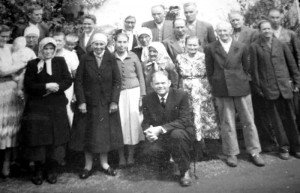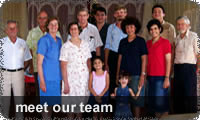When God speaks!
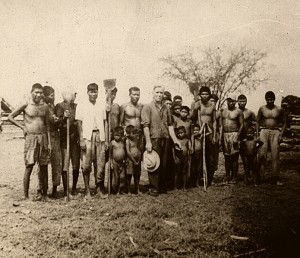 We remember the mercy of God, because He is great, merciful and powerful.
We remember the mercy of God, because He is great, merciful and powerful.
In 1919-1920, a group of believers prayed during a spiritual revival in Latvia, with the purpose of knowing the will of God for their lives, having undergone the horrors of World War I. To their surprise, God revealed that they had to leave their land and their household and travel to a country that He would show to them because He had a work for them in other lands.
It was not easy, but as obedient children they wanted to follow the will of God, so they left like Abraham in Genesis. Some of their relatives and compatriots thought that something was wrong with them, but they were not concerned with what men thought. They were ready to obey God, in spite of the adverse influences and circumstances.
Later, in 1922, God guided them to Brazil, where they arrived with only their suitcases and personal articles. A group of 453 people, between children and adults, settled down in a remote and inhospitable area, which they named Evangelical Corporation Palm. They had few resources and no properties, as the majority had sold houses, land and goods in Latvia (at low prices), to gather sufficient money for the long trip via ship from Europe. But in spite of everything, contentment was felt because they were obeying the Almighty.
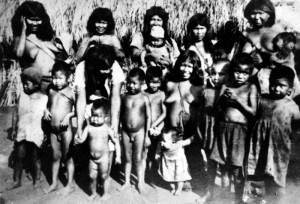 The fight began. Several children died from different epidemics, poor food and harshness of the strange land. Sure of being in the will of God, they continued firm. They begin to testify of the rescuing power of Christ, and even today there are churches in the state of San Pablo as witnesses of this dedication. They had to work arduously to cut down jungle and to make its plantations; it was a fight for survival.
The fight began. Several children died from different epidemics, poor food and harshness of the strange land. Sure of being in the will of God, they continued firm. They begin to testify of the rescuing power of Christ, and even today there are churches in the state of San Pablo as witnesses of this dedication. They had to work arduously to cut down jungle and to make its plantations; it was a fight for survival.
In February of 1944, after much prayer and search of the will of God, 12 brothers of the Baptist Church of Palm left everything and went to a new land. They were Ernesto (the leader of the group and deacon of the Church) and Paula Dundurs, with their daughter Ruth; Jacob and Libe Liger; Juan and Julia Cukurs; Juan Lukenieks; Fritzis Romisch; Hermine Asplinte; Alvine Saurele; and Emma Mizer.
Guided by God, this group took the Paraguay River along the border of Brazil and Bolivia, until arriving at the lake of La Gaiba — another trip to a strange land. We don’t always understand the way God works in His children, since His ways are not our ways. But when God calls and shows His will, He also gives the power and the will to do it.
After three years living in La Gaiba, the missionaries heard about a place called Rincon del Tigre (translated into English, Tiger’s den or corner). Rincon del Tigre was being sold, due in part to the age and health of its owner, as well as the threats of the members of the Ayoré tribe that roamed about the jungle. Guided by God, the missionaries arranged the purchase of this place in faith, as they lacked the total amount of money; but they had confidence that God had guided them to this place, that He would provide!
These missionaries traveled arduously for several days and in terrible footpaths, with mosquitoes, mud and other difficulties until arriving at Rincon del Tigre on November 9, 1946; traveling with them was Pastor Arvido Eichmann. They arrived to settle down definitively in the “land promised by God.”
In the first days, all lived in the only inhabitable house on the place, and although uncomfortable, it was good to have a shelter without having to worry about the fierce animals or the enemies about the jungle!
The hard work began, from very early in the day to late at night. Cutting down jungle for the plantations, planting, cultivating, building houses, taking care of the animals, thus seeking to provide sustenance. Food was scarce, and many necessities had to be brought from outside, but they did not complain. They thanked God that they never went without food.
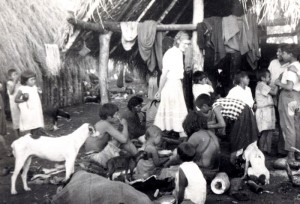 In February of 1948, Pastor Arvido Eichmann and his wife Alida moved in for good. This couple made great efforts and brought blessings to this work. With them came Berta Biernis, and a year later, Julia Ostniek and Ana Urban, and finally Alexander Ansons. The arduous work continued. Pastor Arvido established the body of believers in the Church, organizing it and beginning works of education in the word of God. Later, he started a Bible Institute, working for several years with very good results and continuous blessings.
In February of 1948, Pastor Arvido Eichmann and his wife Alida moved in for good. This couple made great efforts and brought blessings to this work. With them came Berta Biernis, and a year later, Julia Ostniek and Ana Urban, and finally Alexander Ansons. The arduous work continued. Pastor Arvido established the body of believers in the Church, organizing it and beginning works of education in the word of God. Later, he started a Bible Institute, working for several years with very good results and continuous blessings.
Pastor Arvido was the one who forged the foundations of this mission with much prayer and fasting. In order to make important decisions, he spent hours and even days in prayer, until obtaining a clear answer and peace from God. Arvido’s fervor for the work of God was great, and his love for his fellow man was incomparable. He established the principle: “Why ask men, when we can ask God?” — a principle that we continue to follow nowadays; as well as the one of “not owing anything to anybody.” In other words, we do not do anything in debt or using borrowed money. Instead, by faith we wait until God provides it.
Arvido used to say: “If a single soul got to be saved, it would compensate all the work and effort that we make in this place.” But there has not been just one soul redeemed by Christ, but hundreds who have obeyed in the baptism and have been scattered all across Bolivia.
In March of 1954, a seminar graduate named Ruth Lidak arrived at the mission, followed a year later by a young man named Haris Janson. Both left everything in obedience to the Divine call, not only to be united to this work but also being united in marriage. Then Arturo Kilmeier, Claudia Lidak, Juan Kruklis and Velta Kagis arrived.
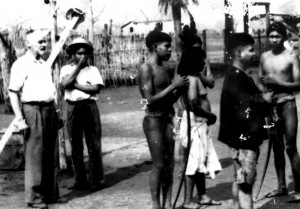 One of the original missionaries at Rincon del Tigre, Jacobo Liger, advised the new arrivals: “If I had another life, I would return to live like a missionary, but with much more dedication and care.”
One of the original missionaries at Rincon del Tigre, Jacobo Liger, advised the new arrivals: “If I had another life, I would return to live like a missionary, but with much more dedication and care.”
On several occasions, the Ayoreo Indians in the jungle demonstrated their presence around the mission, but each time God showed His care and power. During one occasion, Don Juan Lukenieks, who was in charge of transportation by small ox carts, felt the Divine care in a special way. At dusk, he was preparing food to use in the jungle campout, when needing something from the oxcart he went to get it.
A rifle was resting on the things he needed. When he picked up the rifle and set it to one side, he heard noises in the forest. Unbeknownst to him, a group of Ayoreos had surrounded the campout. They had been preparing an ambush, but when they saw the rifle they thought they had been discovered, so they all fled.
On another occasion, a missionary went to the plantations accompanied by two sisters who were also visiting the place. As the area was prone to rain, they took an umbrella, carrying it the whole afternoon. Years later, the Ayoreos told us that in that day they were following them from the jungle to kill them, but feared the umbrella, because they thought that it was a rifle! Again, God’s love and mercy preserved the life of His servants.
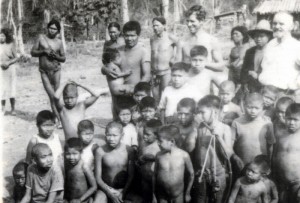 But tragedy came in the afternoon of November 22, 1951. A group of Ayoreos attacked people who were working in the plantations, taking the life of Doña Lucia Barba and her brother Agustín; Don Lorenzo Barba and deacon Jacobo Liger miraculously escaped. Other workers sought revenge but without the support of the missionaries. This fact worried and motivated the mission leaders to pray and begin to see a new field of ministry: the Ayoreos in the jungle!
But tragedy came in the afternoon of November 22, 1951. A group of Ayoreos attacked people who were working in the plantations, taking the life of Doña Lucia Barba and her brother Agustín; Don Lorenzo Barba and deacon Jacobo Liger miraculously escaped. Other workers sought revenge but without the support of the missionaries. This fact worried and motivated the mission leaders to pray and begin to see a new field of ministry: the Ayoreos in the jungle!
Pastor Arvido went to Tobité (a New Tribes camp), where he obtained the support of Don Harschell Dunn (known as Don Jaime). In the company of two Ayoreos, they made several trips in the jungle. Finally, after two years, the first group of 28 people were contacted. With help of these 28 people, another 50 were located, settling down in a place called Campo Nuevo, 12 kilometers from Rincon. Many died from diseases, as they had not yet developed immunities to them.
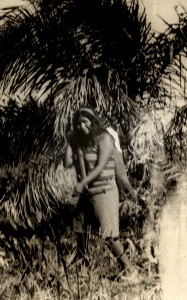 The missionaries began the arduous task of teaching the Ayoreos to cultivate the land and to construct houses, for as previously nomadic people, the Ayoreos had not needed to know these things. They were also taught about the national culture and Divine principles. The Ayoreos’ culture was very different, and their knowledge of language was very tenuous, but the persistence, faith and prayers of the believers eventually led them to see their first fruit, as the Ayoreos began to accept Christ as their personal Savior. The witch doctors, beliefs and superstitions terrified the Indians, making it difficult for them to accept the “new way” announced by the missionaries.
The missionaries began the arduous task of teaching the Ayoreos to cultivate the land and to construct houses, for as previously nomadic people, the Ayoreos had not needed to know these things. They were also taught about the national culture and Divine principles. The Ayoreos’ culture was very different, and their knowledge of language was very tenuous, but the persistence, faith and prayers of the believers eventually led them to see their first fruit, as the Ayoreos began to accept Christ as their personal Savior. The witch doctors, beliefs and superstitions terrified the Indians, making it difficult for them to accept the “new way” announced by the missionaries.
From the beginning, the missionaries saw the great necessity to teach not only reading and writing, but even more spiritual and moral principles.
Many voluntary workers have obeyed the call of God, collaborating in this work through the years. The missionaries who participated in this work have received many blessings and Divine fruits. We praise and glorify Him for His mercy, love and fidelity.
The field continues to grow, and we await new workers for the harvest. How are you going to respond to His call?
